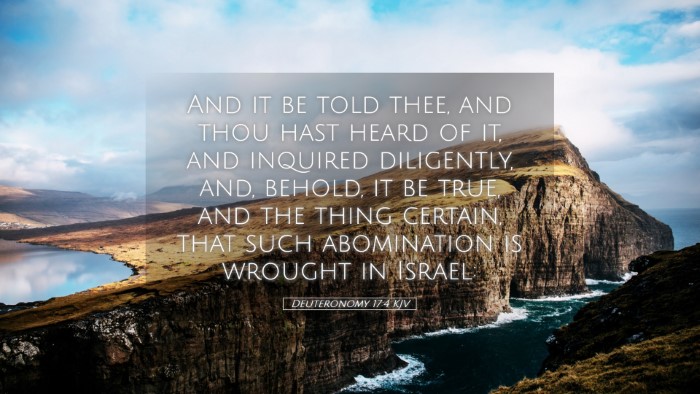Commentary on Deuteronomy 17:4
Deuteronomy 17:4 (KJV): "And it be told thee, and thou hast heard of it, and inquired diligently, and, behold, it be truth, and the thing certain, that such abomination is wrought in Israel."
Introduction
This verse falls within the broader context of the laws given to Israel regarding governance and the conduct of the people, especially in relation to idolatry and false worship. Deuteronomy 17 addresses the responsibilities and procedures necessary for handling cases of idolatry, instructing leaders and judges on how to respond to these grievous offenses against God. The application of these laws is crucial for maintaining purity in worship and community integrity.
Contextual Background
The book of Deuteronomy is essentially a series of speeches by Moses as he prepares the Israelites to enter the Promised Land. Chapter 17 specifically deals with judicial matters and the consequences of sin, particularly focusing on idolatry. The mention of “such abomination” serves as a reminder to the Israelites of the gravity of turning away from Yahweh, who commanded exclusive worship.
Commentary Insights
-
Matthew Henry:
Henry elucidates that the inquiry and subsequent judgment must be exceptionally meticulous. The emphasis on “inquired diligently” suggests a methodology that prioritizes thorough investigation and scrutiny. A mere rumor or hearsay cannot suffice; the integrity of the community demands a more profound inquiry to ascertain the veracity of the claims against individuals engaging in idol worship.
-
Albert Barnes:
Barnes highlights the seriousness of idolatry in Israel. He reflects on how the presence of abominable acts undermines the covenantal relationship between God and His people. According to Barnes, the authority given to the elders or judges must be exercised with utmost care. They should not only verify the allegation’s truth but also take appropriate action to address the transgression, emphasizing the role of leadership in promoting righteousness within the community.
-
Adam Clarke:
Clarke offers a thorough exegesis on the term “abomination,” elaborating on the cultural and religious implications of these acts. He notes that such acts constituted a severe breach of the covenant and were deeply offensive to God. Clarke's analysis underscores that the severity of the punishment prescribed for idolatry is intended not just for the individual but serves as a deterrent to the community, illustrating the need for collective holiness.
Theological Themes
-
God's Holiness:
The verse serves to illustrate the necessity of God’s holiness within the community. The rigorous inquiry before reaching a verdict signifies the profound respect for God’s name and the need to protect His holiness from being tarnished by evil practices.
-
Justice and Righteousness:
The judicial process detailed in this verse highlights the intersection of divine law with human governance. It calls for leaders to exhibit integrity and diligence, embodying justice and righteousness in their decisions.
-
Community Responsibility:
The inquiry process outlined fosters a sense of communal responsibility. The wellbeing of society hinges on the collective vigilance against immorality and detestable practices.
Practical Applications
For modern pastors and church leaders, the principles drawn from Deuteronomy 17:4 are relevant in guiding the church community towards maintaining holiness. Consider the following:
-
Vigilance Against Sin:
Just as the leaders in ancient Israel were to be vigilant, today’s church leaders must earnestly guard against the encroachments of sin within their communities.
-
Encouragement of Accountability:
The process of careful inquiry suggests the importance of accountability among church members. Establishing transparent mechanisms for addressing grievances and sin is vital for a healthy church environment.
-
Promoting a Culture of Truth:
The commitment to ascertain the truth before condemnation is essential. Promoting a culture where truth prevails over hearsay nurtures trust and strengthens community ties.
Conclusion
Deuteronomy 17:4 serves as an enduring reminder of the weighty matters of sin and righteousness within any community of faith. The insights from various public domain commentaries emphasize the need for diligence, justice, and holiness in the life of believers. For pastors and church leaders today, the call to uphold God’s standards remains resolutely applicable. The text poses both a challenge and an opportunity for the Church to reflect the character of God in its communal life and leadership practices.


